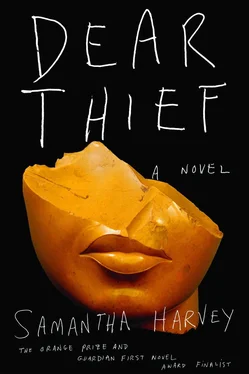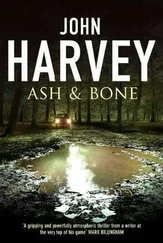From late spring the evening light comes straight into Gene’s room, and now that it is mid-June the light is beginning to flood the bed. I want to tell you something about this: seeing his old, brightly lit body, I had a small revelation, because he appeared almost completely abstract and not a body at all. He was a collection of shapes and colours, and surfaces that were reflective to differing degrees, and angles that went all the way through the compass, from the steep pyramid of his ankle bone, which looked like it had been broken at some point, to the flat plane of his earlobe, to the cratered bullet wound in his left shoulder.
I will surprise you with the fact that I remember exactly what the exhibition was at the Serpentine when Nicolas and I went twenty-six years ago — it was a retrospective of a painter called Jeremy Moon, who made abstract canvases of blocks of colour that were supposed to represent nothing. He wanted us to see a canvas painted yellow and not think of the sun or of cornfields in childhood or of golden beaches or of happiness and optimism, but to see only yellow paint. I did not like his paintings much, but I have always held onto their noble cause — to keep working away from the seduction of memory and metaphors, towards the honest, simple truth. This is green, this is blue, this is yellow, this is a slope, this is a curve, this is bright or dark. I have failed abysmally in this. And yet at work, seeing Gene, at last! Twenty-six years too late, but suddenly I have looked at the body of an old man and managed, with some success, that most difficult of things.
I told Lara that charity isn’t about being kind and humane. It is about seeing without interpretation, as a lens sees. What Teddy called ‘the neutral lens’. I’d completely forgotten about that phrase of his until just then. The neutral lens. Possibly a phrase you gave him. The eye looks on others and itself with motives, games and tricks, and makes things what they are not, but the neutral lens leaves a thing to be what it is.
Lara nodded and turned her pale face on Gene with the kind of cool attention the moon gives the Earth. I admit, though I have never been the meddling type, that I hoped against hope suddenly, watching her, that she and Teddy would meet and fall in love. I married them off with one thought, and with the next there were grandchildren. Four or five, actually. So easy is life! And death too — the way it slinks in. Gene died this morning in the T-shirt Lara and I put him in, a few minutes before I arrived for work at seven a.m. It was just a breath in and no breath out, as simple as that. Like that bit in the tenth Upanishad that you used to enjoy, when Yādnyawalkya says to his wife: ‘Dear! I am going to renounce the world.’ And so renounced, the world — this world, much slaved after and cried over and so full of vulgar triumphs and impressive defeats — is gone.
Part drunk after a few glasses of wine with Yannis, I have been hurriedly preparing for Nicolas’ arrival by taking clothes up from the bedroom floor and vacuuming down the side of the sofa and throwing away the turning milk and hiding the cigarettes and bundling our letter into order. The wine has reduced me to a teenagery sense of misbehaviour. When I was gathering the letter together I reread what I wrote at the beginning, about the gauze and so on — which I hadn’t read since — and I found it childish and defensive, that I should have felt the need to insist like that on having had the kind of experience that could be called ‘metaphysical’ or ‘transcendental’. I am not at all sure it really was, when I come to think of it. It was just the coming together of unusual things: the collecting of the bones, my grandmother sitting dead downstairs, meeting Nicolas on the flood wall and knowing in some acute way that it was a significant meeting. And then you appeared to be hovering by my bed on Boxing Day as the first flake of snow fell (I wrote then that you were hovering expectantly, but I was just being kind, because I was trying then to be kind. In fact you were not hovering expectantly, but accusingly ) and I felt put upon to account for myself, so I stammered something out, and so we began.
Once, it must have been 1979 because I was pregnant with Teddy, I went with Nicolas to the Kent marshes where he had grown up, to his old clapboard bungalow, which was unlived in by that point, and while there I at once understood and accepted who he was — a searcher. Who could be born there and not be, when every point of anchorage slips away into an odd unending blend of water, shingle, scrub and sky. There was nothing else around the bungalow, it was empty as far as the eye went. And yet there was a low brick wall marking off a garden, which seemed such an arbitrary boundary that I could see their lives as one continual striving for perspective, or perhaps just for the comfort of scale. A wall, a raised bed, a wheelbarrow of heathers, a rockery piled with driftwood, a rusted metal stake holding a wind chime made of stones and anything small that clanked or tinkled. Everything owned had been searched for. And I saw him in this setting, a giant against the bungalow’s front door, but a dwarf against the confusing run-in of land and sky. He was tapping the chimes with his fingers, and I thought with victory and tenderness that I had him all worked out. But as soon as we decide someone is a searcher we dismiss the idea of what it is they want to find; they search, that is what they do, so it will always be.
Then you see something in that person’s eyes that is yearning and you dismiss it. They are always yearning! This is one of the things you fell in love with and also, over time, one of the things that is irritating; when they pull a pearl from acres of rushing water you are full of perplexed love at their tenacity, and when they speak again of going back to the Thames to find the lost cow shin or the tail of a peacock you feel compelled to pick a fight with them: You’re grasping and obsessive. Well, you’re impetuous. Why can’t you let things go? Why are you always telling me what to do? Because you’re like a mole-rat, ridiculous, that’s what I think you are, ridiculous. At least I’m not like the Stasi.
A door slams, a book drops, dust flies, a head falls into hands. It is nothing new between couples. But either way, love or hate, the one thing you do not do when you see that yearning is wonder how you can fill it. This never strikes us as possible. Sometimes those closest to us are the most neglectful, I believe this to be true. Another person comes along who sees that yearning and knows instantly what to do with it; it is not a fact to be accepted but a call to arms: Let me take this burden of longing from you. Yes, this is what they say: Let me take this burden from you! And they do, even if only for a few moments and even if replacing it with a longing that is greater still: the longing to have the longing taken again. They do take it. Then streams break out in the desert, as it says in Isaiah. Is it Isaiah, or is it Psalms? Or Jeremiah. My Bible knowledge is terrible these days. But streams and rivers spring up and surge in the desert.
I sometimes put pen to paper and wonder what more I can say, and then I find myself saying what I had never intended. There is always more. And yet now perhaps there is not. Nicolas arrives back in London tonight, or in fact in the small hours of the morning, and is coming straight here from the airport. He should arrive at about five a.m., which happens to be just before I leave for work, though I haven’t told him that. He won’t mind, since it means he can spend the day here sleeping it off. (This plan to arrive at five a.m. was conveyed to me by postcard a week or two ago, in a message that said nothing more than that — a garish postcard with a picture of Fifth Avenue mostly obliterated by the slogan Howdy from New York! He is not the kind of man to invite himself; I read this move — of course I might be wrong — as his final advance, his last act of courtship, to see if I retreat.)
Читать дальше












